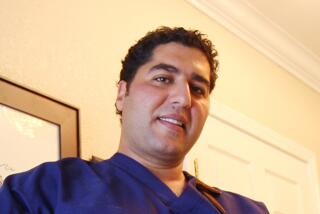Let the Laser Patient Beware
- Share via
Vicki Berman began to notice her aging skin soon after her daughter, now 2, was born. When she decided her face needed laser skin resurfacing--better known as a laser peel--she didn’t expect miracles. She just wanted to look fresher, more rested.
“No problem,” she remembers hearing from the doctor she had selected carefully and trusted. Within two weeks, he told her, expect to look better and be back to normal.
But at the two-week mark, healing wasn’t progressing. Scars appeared. Recalls Berman: “I looked like I had been in a knife fight.”
Now, nearly two years and four corrective surgeries later, the 40-year-old Studio City resident says she is more than $16,000 out of pocket and still needs one additional procedure.
Her story has a painfully familiar ring to some patients of Dr. Adrianna Scheibner’s, a Beverly Hills physician who specialized in cosmetic laser procedures. On March 31, the Medical Board of California suspended Scheibner’s license, accusing her of gross negligence, repeated acts of negligence, drug abuse, incompetence and excessive prescribing.
The board cites the cases of four patients who underwent unsatisfactory laser facial procedures that left some with third-degree burns and permanent scars. One patient wrote the doctor a check for $60,000 after being medicated, underwent up to 20 hours of laser surgery over two days and is permanently scarred, according to the board. In October, Scheibner surrendered her California license.
*
Without a doubt, these cases are the exception, emphasize the growing ranks of doctors who rely on lasers to help improve appearance by softening wrinkles, erasing spider veins, blotting out birthmarks and tattoos and lifting sagging eyelids, among other options.
But as even the staunchest laser advocates acknowledge: It’s a caveat emptor environment.
Any physician can buy a laser--or even rent one--and become a self-described laser expert, no matter what his or her specialty or training. And laser pioneers worry about untrained doctors gravitating to the potentially lucrative field, especially if their incomes have fallen.
Just how risky is laser cosmetic surgery?
Determining the odds of complications for laser-assisted cosmetic procedures is difficult because there is little published data, says Dr. C. William Hanke, president of the International Society of Cosmetic Laser Surgeons and professor of dermatology, pathology and otolaryngology-head and neck surgery at Indiana University School of Medicine, Indianapolis.
And organizations such as the American Society for Laser Medicine and Surgery and the American Society of Plastic and Reconstructive Surgeons don’t track complications from laser procedures, representatives say.
But in one of the few large studies, Hanke reviewed 12,717 patients who had undergone full-face laser resurfacing by trained dermatologists and presented the findings earlier this year at a meeting of the International Society of Cosmetic Laser Surgeons. Scarring occurred in less than 1%, he says. Up to 8% had noticeable darkening of pigment, a complication that can give the skin a blotchy appearance that might not be covered up even with makeup.
But these outcomes, Hanke says, are with physicians skilled in laser use. The horror stories are likely to happen, he and others say, when the laser is wielded by an untrained physician.
And those bad outcomes are on the rise, believes Dr. Lawrence David, a Hermosa Beach dermatologist and laser pioneer, judging from the increasing number of patients arriving at his office asking him to fix other doctors’ mistakes.
Adds Dr. Mitchel P. Goldman, a La Jolla dermatologist: “We see two to five patients a week who have had complications from laser resurfacing [done by other doctors].”
Ten years ago, David says, “we had a group of doctors [performing laser procedures] who were the cream of the crop.” They were willing, he says, to spend time at medical meetings learning the laser techniques, then observe a colleague with laser experience before taking their first patient.
Now, most laser manufacturers sponsor one- or two-day training programs that also incorporate marketing techniques. Most encourage but do not require doctors to enroll before using the laser and to observe colleagues before performing the technique on their own. One exception is Torrance-based NaturaLase, a laser manufacturer. President Judith Coates won’t sell a laser unless a doctor completes a one-day hands-on workshop and a two- to five-day preceptorship with a laser specialist.
*
The logical solution to weed out incompetent cosmetic laser doctors would seem to be to set standards, to develop a kind of laser cosmetic surgery “seal of approval” for doctors, their facilities or both.
“It’s not going to happen,” says Encino dermatologist Dr. Gary Lask, who is also clinical professor of dermatology and director of dermatologic surgery and the Dermatology Laser Center at UCLA. That’s partly due, he and other laser experts say, to the fact that physicians from many specialties, each with their own training and educational requirements, use lasers to perform cosmetic work.
Most laser cosmetic physicians come from four specialty areas: dermatology, plastic and reconstructive surgery, facial plastic surgery or ophthalmology. Less often, family practitioners and obstetrician-gynecologists perform laser cosmetic surgery. Logistically, doctors from these diverse specialties could probably never agree on uniform standards.
So, it’s largely up to the patient to find a competent laser physician. No small task. But here are some suggestions from a host of experts.
* Educate yourself about the procedure.
“This is a controlled burn of your skin,” says Dr. James H. Wells, a plastic and reconstructive surgeon on staff at Long Beach Memorial Medical Center. “We’re controlling the depth of it, but we are clearly burning the skin.” Forget the talk of these procedures always being “lunch hour” surgeries. After a full face laser peel, for instance, Wells keeps patients bandaged for five days.
* Put the risks in perspective. “Least risky,” says Goldman, “is the treatment of birthmarks. Most risky is laser resurfacing.”
That’s because some lasers are more difficult to operate than others, Lask says. The carbon dioxide laser (often used for laser peels or to treat acne-scarred skin) and the newer erbium: YAG laser (used for peels) are “operator dependent,” he says. “The outcome depends on the skill of the operator.” With some other lasers, he says, “you have to try to get a bad result.”
* Consider asking your family physician for a referral or friends who have had the same procedure done and liked the results. Call a teaching hospital or university-affiliated laser center for leads.
* Check up on the doctor. Call the Medical Board of California Consumer Information Line, (916) 263-2382, from 8 a.m. to 5 p.m. Monday through Friday to verify licensure on up to three physicians per call. The board will also release information on any disciplinary actions it or other state boards take, formal accusations, medical malpractice judgments over $30,000 reported to the board after Jan. 1, 1993, and felony convictions reported to the board after Jan. 1, 1993. (For more information, check out the board’s Web site, https://www.medbd.ca.gov.)
* Interview two or three physicians. Such consultations are sometimes complementary. Ask:
--Where did you learn laser techniques? Courses sponsored by physician organizations or universities rather than manufacturers, say laser experts, are often heavier on content, lighter on marketing techniques.
--Do you keep current on training? Doctors should attend a minimum of three courses a year on laser to stay abreast of developments, says David.
--Did you observe colleagues performing the technique before attempting it yourself?
--Is your facility accredited by the American Assn. for Accreditation of Ambulatory Surgery Facilities Inc., or similar groups?
--Do you have medical malpractice insurance? “If in fact anything goes wrong,” says Walter R. Zech, a Santa Ana attorney representing a woman in a cosmetic laser surgery case, “your health insurance probably won’t pay.” But if the physician carries malpractice insurance and you win the judgment, the expenses for corrective procedures are likely to be taken care of.
--What are the costs, and expected discomfort, results and recovery time?
Doctors debate the value of some other questions.
--Do you rent or own your laser? “It’s hard for a laser doctor to get experience if he only rents,” says Dr. Lawrence Moy, a Manhattan Beach dermatologist and laser expert who is also a UCLA assistant clinical professor of dermatology. But Lask counters: “It’s not always practical to buy a machine.”
--How many procedures have you done? “There is no right answer,” Moy says. And it says nothing about quality.
--Could I see before-and-after pictures of other patients? Realize, says John C. Fisher, a Florida-based consultant to laser manufacturers and laser developer, “you’re probably seeing the cream of the crop.” A better approach, in his view: Ask the doctor if you may speak to former patients. If a doctor balks at giving you names, Fisher says, it’s time to leave.






